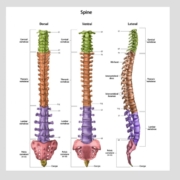5 Essential Nutrients for Strong Bones and Joints Health
When it comes to maintaining a healthy lifestyle, the importance of strong bones and flexible joints often takes a backseat. Yet, these vital components of our musculoskeletal system play a crucial role in our overall well-being, mobility, and quality of life. Just as a sturdy foundation supports a building, robust bones and resilient joints are essential for our body’s structure and function. In this listicle, we’ll explore five essential nutrients that are key to promoting bone and joint health. From the well-known calcium to the often-overlooked vitamin K, each nutrient offers unique benefits that can help you maintain strength and flexibility as you age. Join us as we delve into these nutritional powerhouses and discover how they can support your journey to a more active and pain-free life.
1) Calcium: Often hailed as the cornerstone of bone health, calcium is a vital mineral that provides the structural foundation for bones and teeth. This nutrient is not only crucial for maintaining bone density but also plays a significant role in muscle function and nerve transmission. Dairy products, leafy greens, and fortified foods are excellent sources of calcium, making it essential to incorporate them into your diet for robust bone support
Calcium is often referred to as the backbone of bone health, and for good reason. This essential mineral is not just a building block for bones and teeth; it also plays a pivotal role in various bodily functions. Adequate calcium intake helps to maintain optimal bone density, reducing the risk of fractures and osteoporosis as we age. In addition to its structural benefits, calcium is crucial for muscle contractions and nerve signaling, ensuring that our bodies operate smoothly and efficiently. Incorporating calcium-rich foods into your daily diet is a simple yet effective way to support your overall skeletal health.
To ensure you’re getting enough calcium, consider adding the following sources to your meals:
- Dairy Products: Milk, yogurt, and cheese are classic sources packed with calcium.
- Leafy Greens: Vegetables like kale, spinach, and collard greens provide a plant-based calcium boost.
- Fortified Foods: Many cereals and plant-based milk alternatives are fortified with calcium, making them an easy addition to your diet.
Here’s a quick comparison of calcium content in some common foods:
| Food Item | Calcium Content (mg) |
|---|---|
| 1 cup of milk | 300 |
| 1 cup of yogurt | 400 |
| 1 cup of cooked kale | 200 |
| 1 cup of fortified almond milk | 450 |
2) Vitamin D: Known as the sunshine vitamin, vitamin D is essential for calcium absorption in the body. Without adequate vitamin D, bones can become brittle and weak, leading to conditions like osteoporosis. This nutrient can be obtained through sun exposure, fatty fish, fortified foods, and supplements, making it an indispensable ally in the quest for strong bones and joints
Vitamin D, often referred to as the sunshine vitamin, plays a critical role in maintaining bone health. This nutrient helps the body absorb calcium effectively, which is vital for developing and maintaining strong bones. Without sufficient levels of vitamin D, the risk of brittle bones increases significantly, potentially leading to conditions such as osteoporosis. To ensure you are getting enough vitamin D, consider incorporating the following sources into your diet:
- Sun Exposure: Spending time outdoors allows your skin to synthesize vitamin D naturally.
- Fatty Fish: Salmon, mackerel, and sardines are rich in vitamin D and omega-3 fatty acids.
- Fortified Foods: Many dairy products, cereals, and plant-based milk are fortified with this essential nutrient.
- Supplements: Vitamin D supplements can be an effective way to boost your intake, especially during the winter months.
To better understand the importance of vitamin D in your diet, consider the following table that highlights the recommended daily intake and food sources:
| Source | Recommended Daily Intake |
|---|---|
| Adults (19-70 years) | 600 IU (15 mcg) |
| Older Adults (71+ years) | 800 IU (20 mcg) |
| Fatty Fish (3.5 oz) | 360-600 IU |
| Fortified Milk (1 cup) | 100 IU |
3) Magnesium: Often overlooked, magnesium is a powerhouse mineral that contributes to bone health by aiding in calcium metabolism and supporting the structural development of bones. It also helps regulate parathyroid hormone levels, which play a crucial role in bone remodeling. Nuts, seeds, whole grains, and green leafy vegetables are rich in magnesium, making them excellent additions to a bone-healthy diet
Magnesium is often the unsung hero in the realm of bone health. This essential mineral plays a pivotal role in the metabolism of calcium, ensuring that your bones remain strong and resilient. It supports the structural development of bones by facilitating the conversion of vitamin D into its active form, which is crucial for calcium absorption. Moreover, magnesium helps regulate the levels of parathyroid hormone, a key player in bone remodeling. Without adequate magnesium, the body may struggle to maintain bone density, leading to an increased risk of fractures and osteoporosis.
Incorporating magnesium-rich foods into your diet can be both delicious and beneficial. Consider adding the following to your meals:
- Nuts: Almonds and cashews are particularly high in magnesium.
- Seeds: Pumpkin seeds and sunflower seeds are excellent snacks packed with this mineral.
- Whole Grains: Quinoa, brown rice, and oatmeal are great sources.
- Green Leafy Vegetables: Spinach, kale, and Swiss chard can easily enhance your magnesium intake.
To give you a clearer picture of magnesium’s role in bone health, here’s a simple table summarizing its benefits:
| Benefit | Description |
|---|---|
| Calcium Metabolism | Aids in the absorption and utilization of calcium. |
| Bone Structure | Supports the structural integrity of bones. |
| Hormonal Regulation | Helps regulate parathyroid hormone levels. |
4) Vitamin K: This lesser-known vitamin plays a key role in bone metabolism and helps to regulate calcium in the bones and blood. Vitamin K is essential for the synthesis of osteocalcin, a protein that binds calcium to the bone matrix, thereby strengthening bone structure. Leafy greens, broccoli, and fermented foods are great sources of vitamin K, making them vital for maintaining strong bones and joints
Vitamin K is often overshadowed by more prominent nutrients, yet its significance in bone health cannot be overstated. This fat-soluble vitamin is crucial for the synthesis of osteocalcin, a protein that plays a vital role in binding calcium to the bone matrix. By facilitating the incorporation of calcium into bones, vitamin K helps to enhance bone density and strength, making it a key player in preventing conditions like osteoporosis. A deficiency in this nutrient can lead to compromised bone integrity, highlighting the importance of including vitamin K-rich foods in your diet.
To ensure you’re getting enough vitamin K, consider incorporating a variety of the following foods into your meals:
- Leafy Greens: Spinach, kale, and Swiss chard are excellent sources.
- Cruciferous Vegetables: Broccoli and Brussels sprouts provide a healthy dose.
- Fermented Foods: Natto, a fermented soy product, is particularly rich in vitamin K2.
- Herbs: Parsley and basil can also add a flavorful boost to your vitamin K intake.
For a quick reference on vitamin K content in common foods, check out the table below:
| Food Item | Vitamin K Content (mcg per 100g) |
|---|---|
| Spinach | 482.9 |
| Kale | 817 |
| Broccoli | 101.6 |
| Natto | 1103.7 |
Incorporating these foods into your diet not only supports your bone health but also contributes to overall well-being. Make it a habit to include a variety of these vitamin K-rich foods in your meals to maintain strong bones and joints.
5) Omega-3 Fatty Acids: Beyond their heart health benefits, omega-3 fatty acids are known for their anti-inflammatory properties, which can help reduce joint pain and stiffness. These essential fats also play a role in bone density and overall joint health. Fatty fish, flaxseeds, and walnuts are rich in omega-3s, making them an important component of a diet aimed at supporting strong bones and joints
When it comes to maintaining strong bones and joints, omega-3 fatty acids are a powerhouse nutrient that should not be overlooked. These essential fats are celebrated not only for their heart health benefits but also for their remarkable anti-inflammatory properties. By reducing inflammation, omega-3s can significantly alleviate joint pain and stiffness, making daily activities more manageable for those suffering from conditions like arthritis. Incorporating omega-3-rich foods into your diet can be a game changer for your overall joint health.
To ensure you’re reaping the benefits of omega-3s, consider adding the following foods to your meals:
- Fatty Fish: Salmon, mackerel, and sardines are excellent sources.
- Flaxseeds: These tiny seeds are packed with omega-3s and can be easily added to smoothies or oatmeal.
- Walnuts: A nutritious snack that also supports brain health.
In addition to their anti-inflammatory effects, omega-3 fatty acids also play a crucial role in maintaining bone density. Studies suggest that these fats can help enhance calcium absorption, thereby supporting overall bone structure. By including a variety of omega-3-rich foods in your diet, you’re not only promoting joint health but also fortifying your bones for a stronger, more resilient body.
Closing Remarks
As we wrap up our exploration of the five essential nutrients that play a pivotal role in fostering strong bones and healthy joints, it’s clear that nurturing our skeletal system is a vital part of overall well-being. From the powerhouse of calcium to the supportive embrace of omega-3 fatty acids, each nutrient contributes uniquely to maintaining the strength and flexibility we often take for granted.
Incorporating these nutrients into your daily diet isn’t just a step towards better bone health; it’s an investment in your future mobility and quality of life. So whether you’re a seasoned athlete, a weekend warrior, or simply someone looking to enhance their everyday vitality, consider these essentials as your allies in the journey towards robust bone and joint health.
Remember, every meal is an opportunity to nourish your body. Embrace these nutrients, and let them empower you to move freely and confidently through life. Here’s to strong bones and resilient joints—may they carry you through all your adventures, big and small!










Leave a Reply
Want to join the discussion?Feel free to contribute!